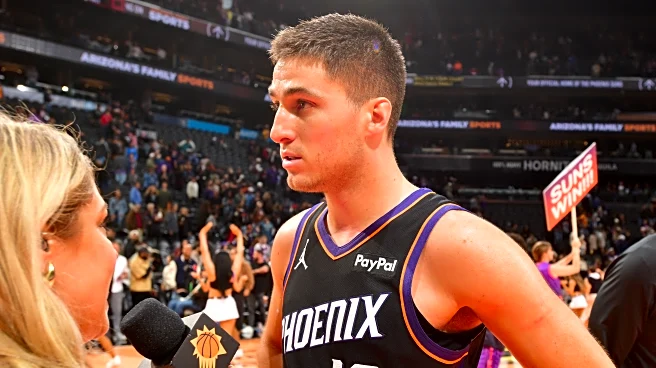There’s already some concern over whether the Suns can afford to re-sign Collin Gillespie next season. He’s already playing well beyond what he’s being paid this year and should get a nice raise in his next contract,
and in this, I’m going to go over the options available to the Suns to make it happen as well as the actual numbers in what the Suns can offer him as well as what other teams can do under the NBA rules.
First, the Suns have Collin’s Early Bird rights. The difference between EBRs and full Bird rights is that the most a team can offer an Early Bird free agent without using cap space is 175% of his previous salary (up to the max) or 105% of the league-average salary in the previous season, whichever is greater. Full Bird rights give teams much more leeway in contract offers, including offers up to a max contract. While this restricts just how much the Suns can offer Gillespie in the offseason, other teams will also be restricted to either using available cap space or an exception to make an offer to him.
As to the specifics of what the Suns can offer Collin, they have no cap space, so that option is out. 175% of his salary this year would be a pitiful $4,163,022, which pretty much any other team could easily outbid. The third option, 105% of the league-average salary in the previous season, is another story though.
According to Basketball Reference, the league average player salary for this season is $12,661,208. 105% of that is $13,294,268, which would be the Suns’ best offer to him in the 1st year of a new contract. He would be eligible to sign a contract for up to 4 years with 8% annual raises.
Early Bird rights max offer
1st year: $13,294,268
2nd year: $14,357,810
3rd year: $15,506,434
4th year: $16,746,949
Total contract value: $59,272,401
The new contract can be for a minimum of two seasons but no more than four seasons, and may include a player or a team option in the final year. The positive for Collin in signing a two-year contract with a player option in the 2nd year instead of one for four years would be that the Suns would then have Collin’s FULL Bird rights, and it would be possible to then offer him an even larger contract if he plays well enough to earn it.
If another team wanted him enough to offer the full non-taxpayer mid-level exception ($15,139,000 in 2026-27), that would be a little more than what the Suns can offer, and it can be used to sign a player for up to 4 years, but only allows for 5% annual raises rather than 8%. As the figures below indicate, in total, this type of contract offer would pay Collin approximately $6 million more over that 4-year period.
Non-Taxpayer MLE offer
1st year – $15,139,000
2nd year – $15,895,950
3rd year – $16,690,747
4th year – $17,525,285
Total contract value – $65,250,982
Would an extra $6 mil spread over 4 years be enough to lure him away from Phoenix? Maybe, but Collin has stated many times how much he wants to stay in Phoenix long-term, so it might not be enough. And one other thing to consider is that using the non-taxpayer MLE immediately hard-caps a term at the 1st tax apron for that season. While that really has no relevance in Collin’s decision, it would definitely play a part in whether a team would be willing to make him that kind of offer. The Suns using their Early Bird rights to re-sign him would NOT hard cap them so that wouldn’t be a consideration for them.
There will be a few teams with enough open cap space to make him an offer that is well over what either of the two offers I mentioned above but I firmly believe that he’s going to have to play at an All-Star/All-NBA level to get much more than either of them. As much as I love Collin and have faith in his abilities, I’m just not sure that he’ll reach that level of play…but also I don’t rule it out completely. While it is possible that another team might make him an offer that the Suns can’t match of compete with, I regard the likelihood of that happening as pretty low at this point.
In conclusion, fans shouldn’t worry too much over whether the Suns can re-sign Collin Gillespie after this season. He wants to stay in the Valley, and the Suns are able to make him a very good, competitive contract offer to do so without putting themselves into a real financial bind in regard to the salary cap. In that regard, at worst, they might have to go above the 1st tax apron to re-sign both him and Mark Williams, but they can do that when re-signing their own free agents.
While that wouldn’t be optimal, the restrictions under the 1st tax apron aren’t nearly as bad as what they faced under the 2nd, and I really don’t doubt that Mat Ishbia would do it if he felt it was best for the team.









